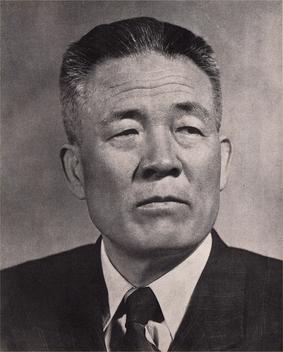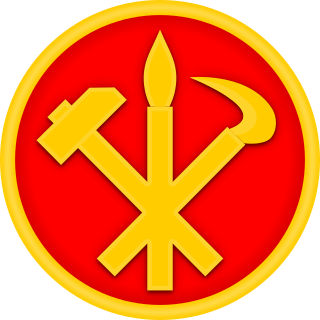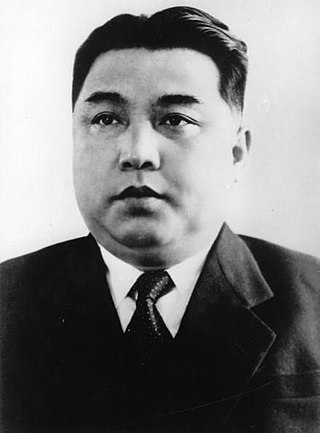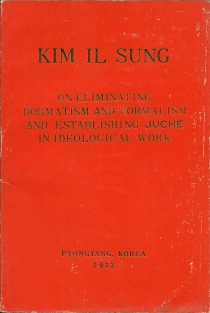
Juche, officially the Juche idea, is a component of Kimilsungism–Kimjongilism, the state ideology of North Korea and the official ideology of the Workers' Party of Korea. North Korean sources attribute its conceptualization to Kim Il Sung, the country's founder and first leader. Juche was originally regarded as a variant of Marxism–Leninism until Kim Jong Il, Kim Il Sung's son and successor, declared it a distinct ideology in the 1970s. Kim Jong Il further developed Juche in the 1980s and 1990s by making ideological breaks from Marxism–Leninism and increasing the importance of his father's ideas.

The Down-with-Imperialism Union was allegedly founded on 17 October 1926 in Hwatian County, Kirin, China, in order to fight against Japanese imperialism and to promote Marxism–Leninism. It is considered by the Workers' Party of Korea to be its root and foundation and its creation is celebrated every year.

Reading is a popular pastime in North Korea, where literacy and books enjoy a high cultural standing, elevated by the regime's efforts to disseminate propaganda as texts. Because of this, writers are held in high prestige.

The Workers' Party of North Korea was a communist party in North Korea from 1946 to 1949 and was a predecessor of the current Workers' Party of Korea. It was founded at a congress on 28–30 August 1946, by the merger of the northern branch of the Communist Party of Korea and the New People's Party of Korea. Kim Tu-bong, the leader of the New People's Party, was elected chairman of the party, while Chu Yong-ha and Kim Il Sung were elected as vice chairmen. At the time of establishment, the party is believed to have had about 366,000 members organized in around 12,000 party cells.
The Communist movement in Korea emerged as a political movement in the early 20th century. Although the movement had a minor role in pre-war politics, the division between the communist North Korea and the anti-communist South Korea came to dominate Korean political life in the post-World War II era. North Korea, officially the Democratic People's Republic of Korea, continues to be a Jucheist state under the rule of the Workers' Party of Korea. In South Korea, the National Security Law has been used to criminalize advocacy of communism and groups suspected of alignment with North Korea. Due to the end of economic aid from the Soviet Union after its dissolution in 1991, the impractical ideological application of Stalinist policies in North Korea over years of economic slowdown in the 1980s, and the recession and famine during the 1990s, North Korea has replaced Marxism-Leninism with the Juche idea despite nominally upholding Communism. References to Communism were removed in the North Korean 1992 and 1998 constitutional revisions to make way for the personality cult of Kim's family dictatorship and the North Korean market economy reform. The Workers' Party of Korea under the leadership of Kim Jong Un later reconfirmed commitment to the establishment of a communist society, but orthodox Marxism has since been largely tabled in favor of "Socialism in our style". Officially, the DPRK still retains a command economy with complete state control of industry and agriculture. North Korea maintains collectivized farms and state-funded education and healthcare.

The Workers' Party of Korea (WPK), also called the Korean Workers' Party (KWP), is the sole ruling party of North Korea. Founded in 1949 from a merger between the Workers' Party of North Korea and the Workers' Party of South Korea, the WPK is the oldest active party in Korea. It also controls the Korean People's Army, North Korea's armed forces. The WPK is the largest party represented in the Supreme People's Assembly and coexists with two other legal parties that are completely subservient to the WPK and must accept the WPK's "leading role" as a condition of their existence. The WPK is banned in South Korea under the National Security Act and is sanctioned by the United Nations, the European Union, Australia, and the United States.

Kim Il Sung was a North Korean politician and military leader. He founded the Democratic People's Republic of Korea, commonly known as North Korea, which he led as Supreme Leader from its establishment in 1948 until his death in 1994. Afterwards, he was succeeded by his son Kim Jong Il and was declared Eternal President.

The Cleanest Race: How North Koreans See Themselves and Why it Matters is a 2010 book by Brian Reynolds Myers. Based on a study of the propaganda produced in North Korea for internal consumption, Myers argues that the guiding ideology of North Korea is a race-based far-right nationalism derived from Japanese fascism, rather than any form of communism. The book is based on author's study of the material in the Information Center on North Korea.

Kim Il Sung was the leader of North Korea for 46 years, from its establishment in 1948 until his death in 1994.
The August faction incident, officially called the "Second Arduous March", was an attempted removal of Kim Il Sung from power by leading North Korean figures from the Soviet-Korean faction and the Yan'an faction, with support from the Soviet Union and China, at the 2nd Plenary Session of the 3rd Central Committee of the Workers' Party of Korea (WPK) in 1956. The attempt to remove Kim failed and the participants were arrested and later executed. Through this political struggle, Kim Il Sung quashed all opposition to him within the central party leadership.
The history of the Workers' Party of Korea (WPK) encompasses the period from 1949 onwards.

The 1st Central Committee of the Workers' Party of North Korea (WPNK) was elected by the 1st Congress on 30 August 1946 through the merger of the Communist Party of North Korea and the New People's Party of Korea, and remained in session until the election of the 2nd Central Committee on 30 March 1948. In between party congresses and specially convened conferences the Central Committee is the highest decision-making institution in the party and North Korea. The 1st Central Committee was not a permanent institution and delegated day-to-day work to elected central guidance bodies, such as the Political Committee, the Standing Committee and the Organisation Committee. It convened meetings, known as Plenary Sessions of the 1st Central Committee, to discuss major policies. A plenary session could be attended by non-members. These meetings are known as Enlarged Plenary Sessions. The party rules approved at the 1st Congress stipulated that the Central Committee needed to convene for a plenary session every third month. In total, the 1st Central Committee convened for twelve plenary sessions, of which eight were convened in 1947.

The 3rd Congress of the Workers' Party of Korea (WPK) was held in Pyongyang, North Korea, from 23–29 April 1956. The congress is the highest organ of the party, and is stipulated to be held every four years. 916 delegates represented the party's 1,164,945 members. The 3rd Central Committee, elected by the congress, reelected Kim Il Sung as WPK Chairman, and a number of deputy chairmen.
Events from the year 1955 in North Korea.

Han Sorya was a Korean writer, literary administrator and politician who spent much of his career in North Korea. Regarded as one of the most important fiction writers in North Korean history, Han also served as head of the Korean Writers' Union and Ministry of Education.

On the Juche Idea is a treatise attributed to North Korean leader Kim Jong Il on the North Korean Juche ideology. It is considered the most authoritative work on Juche.

The 2nd Central Committee of the Workers' Party of Korea (WPK) was elected at the 2nd Congress on 30 March 1948, and remained in session until the election of the 3rd Central Committee on 29 April 1956. In between party congresses and specially convened conferences the Central Committee is the highest decision-making institution in the WPK and North Korea. The 2nd Central Committee was not a permanent institution and delegated day-to-day work to elected bodies, such as the Political Committee, the Standing Committee, the Organisation Committee and the Inspection Committee in this case. It convened meetings, known as "Plenary Session of the [term] Central Committee", to discuss major policies. Only full members had the right to vote, but if a full member could not attend a plenary session, the person's spot was taken over by an alternate. Plenary session could also be attended by non-members, such meetings are known as "Enlarged Plenary Session", to participate in the committee's discussions. During its tenure it held five plenary sessions, one enlarged session, seven joint plenary sessions and four stand-alone plenums.

The Propaganda and Agitation Department, officially translated as the Publicity and Information Department, is a department of the Central Committee of the Workers' Party of Korea (WPK) tasked with coordinating the creation and dissemination of propaganda in North Korea. It is the highest propaganda organization in the country.

The Kapsan faction incident was an unsuccessful attempt to undermine the power of Kim Il Sung, the leader of North Korea, around the year 1967. The "Kapsan faction" was a group of veterans of the anti-Japanese struggle of the 1930s and 1940s that was initially close to Kim Il Sung. In the wake of the 2nd Conference of the Workers' Party of Korea (WPK) in 1966, the faction sought to introduce economic reforms, challenge Kim Il-sung's cult of personality, and appoint its ringleader Pak Kum-chol as his successor.

Officially, the Workers' Party of Korea (WPK) – the ruling party of North Korea – is a communist party guided by Kimilsungism–Kimjongilism, a synthesis of the ideas of Kim Il Sung and Kim Jong Il. The party is committed to Juche, an ideology attributed to Kim Il Sung which promotes national independence and development through the efforts of the masses. Although Juche was originally presented as the Korean interpretation of Marxism–Leninism, the party now presents it as a freestanding philosophy of Kim Il Sung. The WPK recognizes the ruling Kim family as the ultimate source of its political thought. The fourth party conference, held in 2012, amended the party rules to state that Kimilsungism–Kimjongilism was "the only guiding idea of the party". Under Kim Jong Il, who governed as chairman of the National Defence Commission, communism was steadily removed from party and state documents in favour of Songun, or military-first politics. The military, rather than the working class, was established as the base of political power. However, Kim Jong Il's successor Kim Jong Un reversed this position in 2021, replacing Songun with "people-first politics" as the party's political method and reasserting the party's commitment to communism.


















